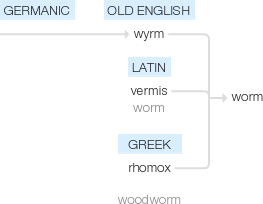Worm
Old English wyrm (noun), of Germanic origin; related to Latin vermis ‘worm’ and Greek rhomox ‘woodworm’.
wiktionary
From Middle English worm, werm, wurm, wirm, from Old English wyrm(“snake, worm”), from Proto-Germanic *wurmiz, from Proto-Indo-European *wr̥mis, possibly from *wer-(“to turn”). Cognate with Dutch worm, West Frisian wjirm, German Wurm, Danish orm, Norwegian orm. Indo-European cognates include Latin vermis(“worm”), Lithuanian var̃mas(“insect, midge”), Albanian rrime(“rainworm”), Ancient Greek ῥόμος(rhómos, “woodworm”). First computer usage by John Brunner in his 1975 book The Shockwave Rider.
Doublet of wyrm, which is a fairly recent borrowing directly from the Old English.
etymonline
worm (n.)
Old English wurm, variant of wyrm "serpent, snake, dragon, reptile," also in later Old English "earthworm," from Proto-Germanic *wurmiz (source also of Old Saxon, Old High German, German wurm, Old Frisian and Dutch worm, Old Norse ormr, Gothic waurms "serpent, worm"), from PIE *wrmi- "worm" (source also of Greek rhomos, Latin vermis "worm," Old Russian vermie "insects," Lithuanian varmas "insect, gnat"), from PIE *wrmi- "worm," from root *wer- (2) "to turn, bend."
The ancient category of these was much more extensive than the modern, scientific, one and included serpents, scorpions, maggots, and the supposed causes of certain diseases. For substitution of -o- for -u-, see come. As an insult meaning "abject, miserable person" it dates from Old English. Worms "any disease arising from the presence of parasitic worms" is from late Old English. Can of worms figurative for "difficult problem" is from 1951, from the literal can of worms a fisherman might bring with him, on the image of something all tangled up.
worm (v.)
"to move like a worm," c. 1600, from worm (n.). In figurative senses attested from 1620s, suggesting patient, sinuous progress. Meaning "to free from worms" is from 1620s. Related: Wormed; worming.
